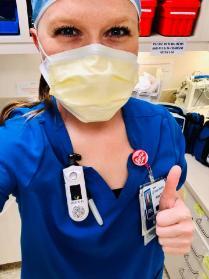ER Nurse Alex Hendee ’15 reports from the front lines of COVID-19

We’ve heard a lot lately about the challenges and risks healthcare workers are facing these days. We asked Alex Hendee ’15 to give us a nurse’s perspective on the COVID-19 crisis.
Tell about your career path to becoming a nurse.
In 2015, I graduated with a biology degree from TXWES. After graduation, I started a job as a scribe (someone who follows a physician and completes their charting) in the emergency department. I was terrified of the setting I would be working in, but I wanted to "get my feet wet" in the hospital environment. I had an amazing 2-year experience as a scribe and realized that, ironically, ER nursing was the route for me!
What kind of growth has your hospital seen, and how are the nurses and doctors adjusting and coping?
The emergency department I work for typically has a high patient volume (between 350-400 patients daily). When COVID-19 started to be a concern in DFW, more patients were coming in with concerns about their symptoms. We have an amazing management team who immediately began working on a system to accommodate the potential growth in COVID-19 cases. Part of these changes included completely restructuring how our ER patients are triaged, roomed and cared for in an attempt to keep potentially infectious COVID-19 patients separated from our "healthier" patients. This is a process that we continue to test, evaluate and adjust as needed.
Our primary concern is providing the best patient care we can, in the safest way possible. At this time, we feel like we're in a "waiting" period; we have an overall lower patient census, but expect things to "rev up" once the virus has spread across DFW. My hope is that social distancing and the population staying home will prevent this, but we as a team are doing our best to be prepared for the worst.
What are healthcare workers doing to stay safe?
The use of proper PPE (personal protective equipment) is the largest contributing factor to staying safe as a hospital worker. The CDC defines which PPE is necessary for each patient based on symptoms and which disease/illness is being ruled out or treated. Unfortunately, COVID-19 is still a novel virus and its transmission is not fully understood. As a result, our PPE guidelines while taking care of potential COVID-19 patients has changed and fluctuated multiple times, but we are flexible and follow the guidelines that are given to us each shift. Aside from PPE, our charge nurses and managers take care to avoid placing staff who are immunocompromised or pregnant with potential COVID-19 patients.
Is your hospital experiencing a shortage in PPE?
At this time, our staff has been told that we are approaching shortages in surgical masks, but have an adequate supply of N95 masks for the time being. A recent change to our hospital policy requires each staff member to wear a surgical mask for the entire duration of a shift. This policy change was placed in an attempt to better protect both patients and staff, but may be the reason for the shortages in surgical masks rather than N95 masks.
What can we do for friends and family members in the healthcare industry during this crisis?
- I know that I'm not the first person to say this but, PLEASE STAY HOME and WASH YOUR HANDS! I understand everyone is getting stir-crazy, but we all play a huge part in preventing the spread of this virus. By staying home, you're helping healthcare workers!
- Reach out to your friends/family members who work in healthcare and check-in on them. They may not be able to see you physically, but your emotional support may be exactly what that person needs at this time more than anything else. It's a scary time of uncertainty and isolation for us.
- A lot of people have wanted to donate food/treats to the hospital. This is such a kind gesture! If you decide to give food, individually wrapped treats are the way to go! This helps prevent spreading germs across staff members.







